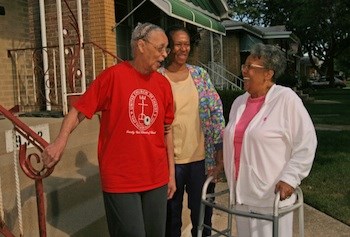Funds to Help Find Safer Cleaning Methods for Home Health Workers

11/25/2014
By Karen Angelo
As treatment of serious illnesses in the home increases, so does the risk of infections typically only seen in hospitals and rehabilitation centers.
To fight these infections, more cleaning and disinfecting products with toxic chemicals are being used, raising health concerns like asthma for home health care aides, nurses, patients and the community.
To find the right balance between fighting infections and using safer cleaning and disinfection methods and products, the National Institute for Occupational Safety and Health (NIOSH) awarded Prof. Margaret Quinn of the Department of Work Environment a $2.4 million four-year grant.
“Demand for more effective cleaning and disinfecting is growing due to emerging infectious agents and rapidly developing strains of multi-drug resistant organisms,” says Quinn. “At the same time, there is increasing evidence that exposure to cleaning and disinfecting products and practices can result in acute and chronic health effects, particularly asthma and other respiratory illness.”
A project of the Lowell Center for Sustainable Production, the Safe Home Care Cleaning and Disinfection project research team will determine which infectious agents found in the homecare environment can be reduced by using different cleaning and disinfecting options. Researchers will evaluate the health effects of respiratory exposure from cleaning practices and identify safer, and possibly more effective methods of disinfecting patient homes — an enormous benefit to both patients and medical workers.
Quinn will work in collaboration with Asst. Prof. Nancy Goodyear of the Department of Clinical Laboratory and Nutritional Sciences and Department of Work Environment faculty members Assoc. Prof. Manuel Cifuentes and Research Profs. Pia Markkanen and Susan Sama. The work will be conducted in partnership with Toxics Use Reduction Institute (TURI) and the Massachusetts Department of Public Health.
Patients returning home from the hospital can be carriers of drug-resistant pathogens such as Methicillin-resistant Staphylococcus aureus (MRSA) and Clostridium difficile (C diff), which can compromise the health of their caregivers and the community.
“Drug-resistant pathogens are increasing in hospitals and nursing homes where patients are often immunocompromised due to illness or medication,” says Quinn, “As a result, cleaning and disinfecting is a major part of the daily work of homecare aides."
